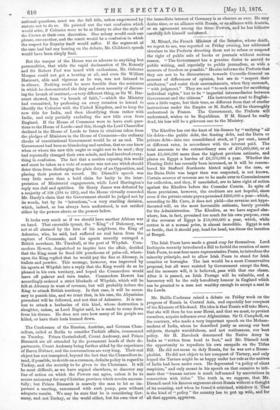But the temper of the House was so adverse to
anything but personalities, that while the vapid declamation of Dr. Kenealy and Sir Robert Peel was heard with enthusiasm, Mr. Osborne Morgan could not get a hearing at all, and even Sir William Harcourt, able and vigorous as he was, was not listened to in silence. Nothing could be more forcible than the sentences in which he demonstrated the duty and even necessity of discuss- ing the breach of contract,—a very different thing, as Sir W. Har- court showed, from "a breach of faith,"—which the Ministry had committed, by professing on every occasion to intend to identify the Colonies with the United Kingdom, and to keep the new title for India, and then identifying them rather with India, and only partially excluding the new title even from England. If the House of Commons were to leave such ques- tions to the House of Lords—and this, though the Lord Chancellor declined in the House of Lords to listen to citations taken from the pledges of Ministers in the House of Commons—the ordinary checks of constitutional Government would be at an end. The Government had been so blundering and careless, that no one knew when or where the new title ought or ought not to be used ; they had repeatedly changed their own minds, and had involved every- thing in confusion. The fact that a motion exposing this would and must be taken as a vote of censure was not one which should deter them from discharging the plain duty of an Opposition, and placing their protest on record. Mr. Disraeli's speech was very little more than a bold claim for laxity in the inter- pretation of Ministerial engagements, while Lord Hartington's reply was dull and spiritless. Sir Henry James was defeated by a majority of 108 (334 to 226), and the House virtually conceded Mr. Hardy's claim that the Government should be judged not by its words, but by its " intentions,"—a very startling decision, which, indeed, as has always been understood, is not ratified either by the powers above or the powers below.


































 Previous page
Previous page